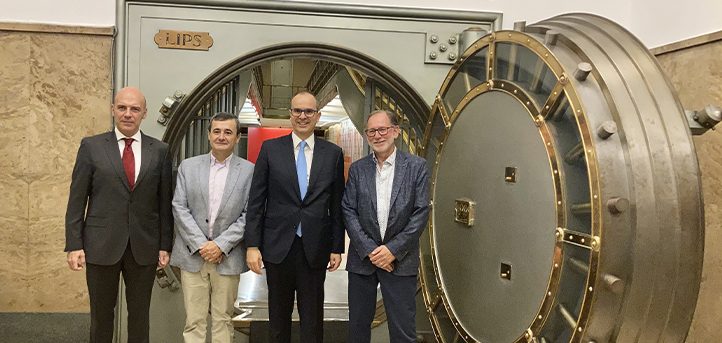The fourteenth edition of the Tribuna del Hispanismo took place this Monday, dedicated on this occasion to Canadian Hispanism. In this context, Alfredo Martínez Serrano, Spanish ambassador to Canada, praised the different lines of collaboration with the Ibero-American University Foundation (FUNIBER), as well as the contributions of the lecturer from the European University of the Atlantic, Frigdiano Álvaro Durántez Prados.
This Monday, the auditorium of the Cervantes Institute in Madrid hosted a new edition of the Tribuna del Hispanismo, a forum that brings together renowned international Hispanists to present the history, trajectory and specificities of Hispanic studies in different countries or geographical areas, to analyse a specific aspect of Hispanism and to pay tribute to scholars of Hispanic cultures.
This year’s Tribune focused on Canada. The event, presented by the Spanish ambassador to Canada, Alfredo Martínez, included a round table moderated by Antonio Cazorla with the participation of historians Adrian Shubert, Yolanda Iglesias and Lauren Beck. The closing address was given by Wendy Drukier, the Canadian Ambassador to Spain.
At the beginning of the Tribune, Ambassador Martínez highlighted the various avenues of collaboration and work opened up following the visit to Canada last May by a delegation from the Ibero-American University Foundation (FUNIBER), led by its president, Dr Santos Gracia Villar, to strengthen academic and cultural ties between that country and the Ibero-American Community of Nations. This initiative in the American country was promoted by Ambassador Martínez Serrano and included several speeches by Dr. Frigdiano Álvaro Durántez Prados, also present at the Cervantes Institute event, director of Institutional Relations of the foundation and of the FUNIBER Chair of Ibero-American Studies and Iberophony, and professor at the European University of the Atlantic.
In this context, Ambassador Martínez highlighted the conference given in May by Durántez Prados at the Mexican Embassy in Canada, under the patronage of the Dominican Republic, as Pro Tempore Secretariat of the Ibero-American Conference, and Panama as Pro Tempore Presidency of the Central American Integration System. “Dr. Durántez brilliantly addressed the enormous power of Spanish and Iberophony. It was a great exercise in Ibero-American collaboration that elevates us and gives us cohesion as a Spanish-speaking community throughout the world,” said the ambassador.
In addition, the diplomat praised the work of Dr Durántez “in curating the magnificent cartographic exhibition on Canada in the Spanish map collections on display in the Bodega y Cuadra Hall of the Spanish Embassy in Ottawa and his lecture on this subject,” he said.
Finally, Martínez Serrano highlighted the avenues of collaboration that the Foundation has initiated with universities in Canada: “FUNIBER is working with the universities of Ottawa and Carleton to conclude agreements that encourage exchanges. This leads me to highlight the decisive importance of creating bridges between Spanish and Canadian universities with which Hispanic Studies in Canada can contribute its enormous merits and grow accompanied by solid partners who share the same concerns”.
In the ensuing dialogue, the scarcity of Canadian historians specialising in Spain or the Hispanic World was highlighted. In this context, Dr Durántez pointed out that this lack of specific historiography particularly affects studies on ‘jurisdiction, sovereignty, exploration or the presence of Spain during centuries in the territories of the future Canada’. According to Durántez, these topics offer important possibilities for Hispanists and historians who explore them. In addition to this, the academic from Madrid highlighted the cultural work and the promotion of Hispanic studies carried out by the Spanish Embassy in Canada and the diplomat Alfredo Martínez, as well as reiterating FUNIBER’s determination and commitment to continue collaborating in the same.


